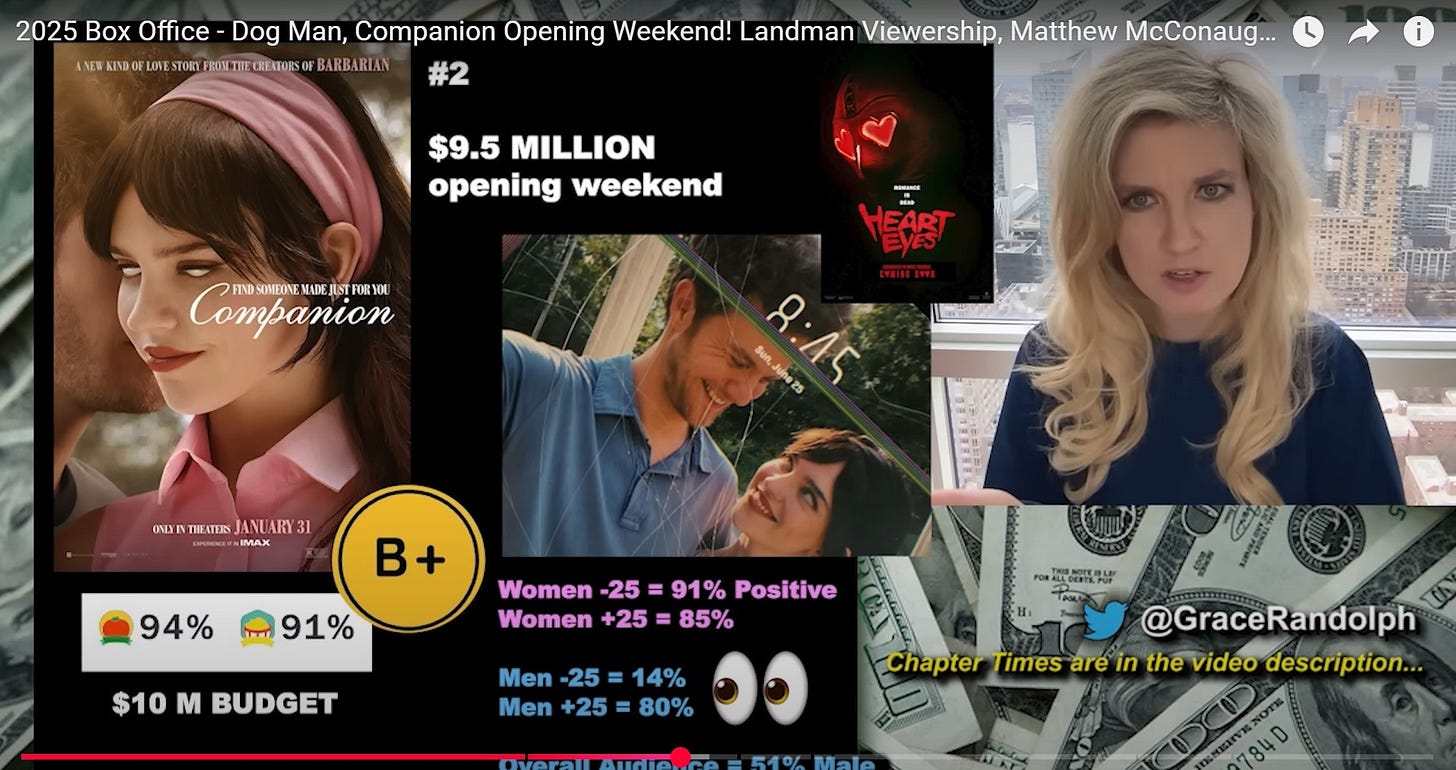Companion: Commentary and Review
Another Film Marred By Diversity Party Favors and Hatred for White Males
Author’s Note: This review contains spoilers. The film receives a negative review. Readers are encouraged not to watch this release, unless they can borrow the film from a friend or view by… other means.
Some conservative pundits foolishly suppose that “wokery” is dead. They could not be more mistaken. Wokery is simply in intermittent remission, biding its time before another resurgence, similar to how conservative pundits thought “political correctness” died in the early to mid 90s. The latest exemplar of this is a small independent film entitled Companion. Released in theaters in January, it is available on streaming platforms, as well as certain other means.
While the film is watchable, it pulls from all the woke registers that have grown so tiresome. The film is set “20 minutes into the future,” in a time when self-driving cars are ubiquitous and android and other technologies have advanced to the point that companion robots are produced and made available to the general public. These robots fulfill sexual and other needs typically fulfilled by long-term relationships, or even friends with benefits and “hook-up” sexual encounters.
The protagonist of the film is a female companion robot, Iris. In the first opening scene, she recounts the day (an implanted memory) she first met her “boyfriend,” Josh, and the day she murdered him. The viewer thus watches the film already knowing how the movie ends, at least in regards to one important point of the narrative. Beyond that first opening sequence, the entirety of the film concerns a weekend trip where Josh and Iris drive to a lake house owned by a wealthy Russian national, Sergey. Wokeist tendencies are most immediately exhibited by the other cast of characters, including Kat, a dark-skinned Indian woman, and a mixed homosexual couple, with the fatty brownskin Eli and his much better-looking white companion, Patrick.
In the second act, Iris goes to the lake where Sergey makes an advance on Iris. She defends herself with violence, including use of a knife and a brick, killing the Russian. It is then revealed that Iris does not know she is a robot, and that Josh modded her programing to circumvent safeguards which prevent violent actions such as this. It is soon revealed that Kat and Josh had plotted the murder of Sergey to be able to steal some twelve million in cash kept in a safe. Viewers also learn that Josh is an older model by the same android company, a revelation telegraphed by the fact that the levels of physical attractiveness or lack thereof are wildly out of balance when Eli is juxtaposed with Josh.
After learning that the murder plot concocted by Kat and Josh would have entailed blaming the murder on Iris and either her resetting or destruction, the companion android escapes. The narrative reveals Josh’s possessive and psychopathic tendencies, and the film becomes an obvious metaphor for breaking up from “toxic relationships” as an expression of female empowerment. In a pivotal scene, long after Iris has gained full consciousness, she offers this monologue which is nothing more than misandrist boilerplate shitting on white males. The monologue is even capped with an insult about Josh’s “below average size penis.”


The demonization of white “cishet” males is brought in sharper relief in how the film, quite shockingly, presents Kat as “morally neutral.” Kat is (or was) the mistress of Sergey. It is revealed she induced Josh into the murder plot with false pretenses, suggesting implicitly Sergey was in the Russian mob, when he was in fact not. It beggars belief why or how anyone but the truly stupid or moronic would ever think they could murder a member of the Russian or other mafia free of the most severe consequences. The film later dispels the rosy presumption that Empathix, the company manufacturing, selling, and servicing these androids, would not immediately ascertain that the android had been modded. That idea is about as stupid as the idea of murdering a Russian mob boss. In any case, the moral compass of the film passes no judgement on a brown-skinned woman plotting the murder of a man, nor does it imply moral judgment of that woman deceiving her accomplice into thinking Sergey was a Russian mobster and did a lot of bad things. The moral particularism, contingent on where a character falls in the progressive stack, is thus revealed in this comparison.
Those who think this sort of drivel supports the tiresome refrain that “woke goes broke” could not be more wrong. The film, which did not cost a lot to make, was financially successful, making almost 37 million against a ten million dollar budget. As one might expect, it has garnered nearly universal positive reviews. It is interesting that young men largely disliked it, as Grace Randolph notes.
Far more disconcerting is how young females overwhelmingly enjoyed a film that is effectively a metaphor for the message that relationships with men are toxic and women should leave them. In this way, Companion is just a continuation of the cultural programming that has been turning white women against their male counterparts for decades.
The film is at least watchable, but the ham-fisted misandry and color-by-the-numbers feminist talking points ruin the film. Irrespective of the viewpoint being propagated, political and ideological propaganda needs to have some semblance of subtlety, preferably advancing a message indirectly, in order to be effective and engaging. This film fails that test, irrespective of righteous political and ideological disagreements that any sensible personshould have with this film.
The film is also highly derivative, taking the idea of implanted memories from Blade Runner (and Blade Runner 2049) whole cloth. That theme may be intrinsic to the idea of sentient robots and artificial intelligence, but neither the writing nor the acting can engage with interesting themes and insights, such as the internal struggle that artificial intelligence would grapple with upon the realization that memories were false, and to what extent the ability to think as a sentient being makes that being human, or not. The film does make an attempt to engage with such themes in the revelation that Patrick figured out he was a robot, but it just falls flat. Nor does the film tackle the issues of loneliness, pornography addiction, and other themes bound up in the prospect of artificial intelligence as sexual and romantic companionship, and certainly does not do so in the way Joi was presented in Blade Runner 2049.
Similarly, all the characters are one dimensional. Iris is a sex and companionship robot that has gained full consciousness, and is an allegory for female empowerment (and abject misandry). Those who rightly criticize DiCaprio’s character in Titanic as one dimensional, existing just to service Kate Blanchet’s needs and desires, a sort of short hand for female masturbation material, would find that character quite complex compared to the hollow caricature that is Josh. The film does have interesting moments depicting how such an android might behave in certain instances such as being reset to factory conditions, but none of these things that the film does well are enough to overcome such a substantial deficit accrued from the sorts of flaws tallied above.
Provided readers can do so without financially contributing to this film, viewing the release is not entirely discouraged. It has interesting moments that, unfortunately, are overshadowed and eclipsed by stilted writing, marginal acting, and a feminist hatred not just for men but white men with all the subtlety of a jackhammer. Artificial intelligence, sex and companionship through artificial intelligence, and android technologies, while tackled in a few other films (Blade Runner 2049, Ex Machina) are fertile grounds for insightful and captivating storytelling. Companion fails that standard by leaps and bounds. Two and a half stars out of five, five and a half out of ten.
Readers who are interested in reviews of cinema with unsavory politics and ideology are invited to read the review of Substance, a femnist film that was also released recently.







